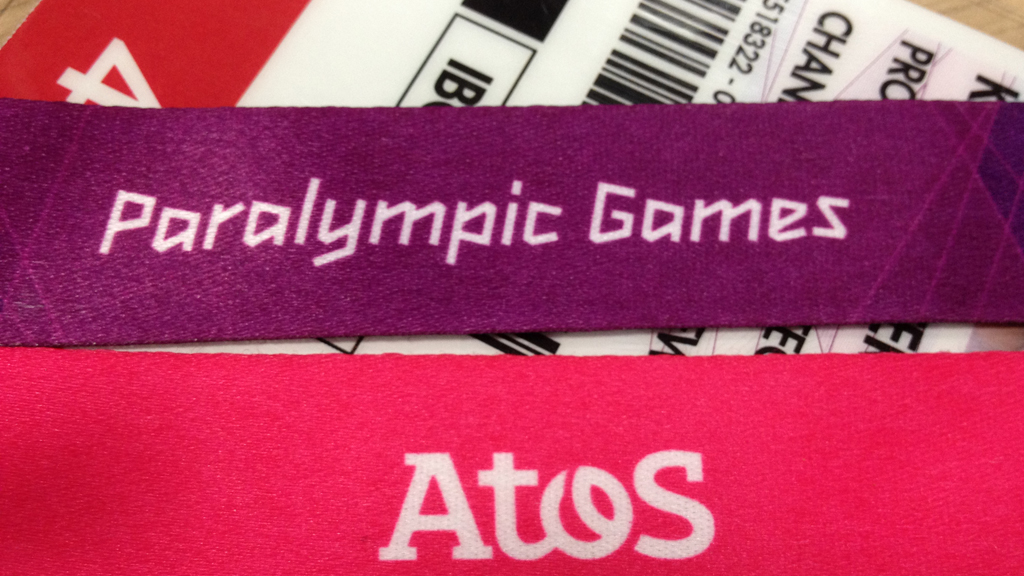Did GB Paralympians choose to hide Atos branding?
Disability campaigners took to Twitter last night during the Paralympics opening ceremony to speculate on why GB athletes had hidden the Atos branding on their passes.

The company, which holds the £100m government contract to carry out controversial “fit to work” tests, has been fiercely criticised by some for its role in slashing the benefits bill.
As a main sponsor, Atos has its logo clearly featured on Paralympic signs and the accreditation lanyards (the tape that is used to hang a pass around the neck) which are worn by all athletes, officials, media and volunteers.
But Locog today said it was unaware that athletes had concealed the branding and again defended its use of Atos as a sponsor.
“They are one of our sponsors. Without them, as I said yesterday, we don’t have a Games,” said Locog’s director of communications, Jackie Brock-Doyle.
A Paralympics volunteer who worked as an audience leader in the stadium during the opening ceremony told Channel 4 News that, although she had a large pass with the Atos branding on it, she had been given a small paper wristband so that participants didn’t have to use the big pass.

‘Clear message’
Disability activist Kaliya Franklin told Channel 4 News that the protest by ParalympicsGB was “incredibly powerful” in its message to the wider disabled community.
“It says we’ve found a way to show solidarity with you that doesn’t breach regulation or contravene the spirit of the Paralympics.
“Our Paralympic heroes are sending a clear message to the wider disability community that they’re not entirely comfortable with Atos sponsoring the games.
Our Paralympic heroes are sending a clear message to the wider disability community that they’re not entirely comfortable with Atos sponsoring the games. “They’re saying that this is not an acceptable way to treat disabled people. – Kaliya Franklin, disability activist
“They’re saying that this is not an acceptable way to treat disabled people,” Ms Franklin said.
At the Olympic park the day after the opening ceremony Channel 4 News spoke to Tracey Homden, who has partial feeling in her feet and hands, short term memory problems and fluid on the brain following a car accident in 2009. She supports any demonstration against Atos which found her fit to work, a decision that was later overturned at appeal. Ms Homden says that the whole system of disability benefits needs “a kick” and that it’s a “battle” to get any benefits.
The Chief Executive of UK Disabled People’s Council Jaspal Dhani told Channel 4 News: “We’ve received many reports from members who have been assessed and lost benefits and many people have appealed. In one case our chairman represented an individual at tribunal and it took nine months during which time the individual was without benefits, so I don’t know how they survived.”
More protests
Activists from UK Uncut and Disabled People Against Cuts (DPAC) are pressing forward with demonstrations against Atos, vowing to shut down its HQ in Central central London.
Tara Flood, a gold-winning former Paralympian, has come out in support of the campaign.

“It is a shocking irony that Atos is a main sponsor of London 2012 whilst destroying disabled people’s lives on behalf of the government,” she said.
But Kaliya Franklin told Channel 4 News that the criticism needs to be directed at the government’s Department of Work and Pensions.
“The root of the problem is the DWP. It will be pleased with all the negative attention Atos receive because it’s deflected away from the DWP.
“But ultimately, the government sets the guidelines and the descriptors.
“Atos workers are just doing their job and following them. Most of these people are trying to do they best they can in incredibly difficult circumstances,” she said.
Atos is in the running to secure a string of multimillion-pound government contracts to deliver eligibility assessments for independence payments which are set to replace Disability Living Allowance (DLA) in 2013.
Around 500,000 people are expected to lose this benefit over four years as the government tightens its criteria to qualify for payment.
-
Latest news
-
Ex-Trump lawyer Michael Cohen testifies at hush money trial3m

-
Racial hate speech laws being ‘weaponised’ warns National Black Police Association7m

-
‘Hard to believe so many women going through such horrors’, says woman whose baby daughter was stillborn8m

-
Damning report condemns ‘shockingly poor’ UK maternity services12m

-
People ‘expecting the West to stand by Georgia’, says opposition party leader5m

-




